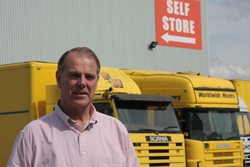Steve Jordan interviews Andy Wade of F&N Removals in Grantham.
Andy Wade has been in the moving business for 30 years. After working with a number of companies he settled 12 years ago working with Paul Fletcher at F&N. Andy has also given his time to help BAR. He’s been the chairman of the East Midlands Area for 15 years, a member of the National Council, now serves on the Overseas Group Council and is also the deputy chairman of FIDI UK. I figured hat Andy’s opinion would be worth listening to. I wasn’t wrong.
I caught up with Andy at his company’s self storage facility in Peterborough. I didn’t have an agenda so asked Andy if there was anything he was burning to talk about. There was.
Andy said that he had seen many changes in the industry during his working life but none so radical as the recent change in the way in which business is acquired. Gone are the days of Yellow Pages adverts, migrant newspapers and leaflet drops. Now it is the Internet that is king – if you do it right. “Most companies haven’t realised how it works and what they are missing,” he said.
For a moving company to really embrace trading on the Internet it has to let go of a few 20th century values. It’s necessary to appreciate that the world has changed, customers are used to buying on the Internet, they have become accustomed to a different level of service, they understand price comparison sites and are prepared to accept more automation of the process. “In the old days I thought we couldn’t possibly do a move without a survey. Now my attitude has changed radically,” said Andy. “Customers understand computers. There is not nearly as much problem as there used to be.”
 To trade effectively on the Internet the website is, of course, key. It has to be easy to navigate and must lead the customer through the process of obtaining an estimate. “We have three levels on our site: call me; this is what I’ve got; and detailed information.” Customers can give some basic details for a rough estimate of fill out a much more detailed form for a more accurate figure.
To trade effectively on the Internet the website is, of course, key. It has to be easy to navigate and must lead the customer through the process of obtaining an estimate. “We have three levels on our site: call me; this is what I’ve got; and detailed information.” Customers can give some basic details for a rough estimate of fill out a much more detailed form for a more accurate figure.
Andy drives people to his website by buying Google Adwords. This allows him to decide exactly how much he wants to spend promoting on the Internet from week to week. “It allows me to fill in holes in our diary,” he explained. “If we are quiet I might spend £5,000 a month on Google, if not the figure might drop to a few hundred.” The flexibility of using Google in this way allows Andy to manage his level of business to make sure his resources (men and vehicles) are productively employed most of the time.
Of course he gets a lot of enquiries he doesn’t want. “We have to be quick on our feet to sort them out. We will do surveys if necessary but most customers are happy to accept an estimate and for us to make adjustments later.” He explained that sometimes it’s easier just to accept small variances in volume, but customers generally are happy to pay up if the volume is higher than expected. “We’ve had jobs come in at double or even triple the quoted size and the people pay up.”
When BAR launched its new website a couple of years ago Andy was delighted. “It’s a good website that does what it says. I like it very much. But it doesn’t produce and leads because nobody is directed to it. People don’t type in ‘BAR’ they type in ‘Moving o Scotland’ and get directed to whoever paid most to Google. It’s a wonderful website but with no purpose.”
Another big change is the rise of the e-bookers. There are three basic types and Andy works with all of them. Some companies just sell leads; some ask F&N for a rate, take an introduction fee from the customer then pass the job over; others sell the move themselves and then employ F&N as a subcontractor. “This last group is quite good because we have none of the responsibility of selling the job in the first place. Nor do we have any aggravation from the customer if anything goes wrong.” Andy admits though that when working for e-bookers you have to be very hot on credit control. “If the job comes in oversize we don’t deliver until the balance is paid. You have to set a credit limit that you can afford and stick to it. If the credit limit is exceeded, don’t move the shipments. They are very hard-nosed sales people who absolutely understand if you are hard-nosed back. You just have to stand your ground.”
Andy is very careful with his costing. He understands his costs and never works for nothing. “My staff know about profitability. If we are going to make a loss on a job we might as well send the enquiry back and enclose a £50 note.”
It is clear that Andy has embraced online trading and is making a success of it. The old days have gone and won’t come back. Any moving company that wants to be successful and remain so, would be wise to accept that customers understand computers, are prepared to do research online, like shopping online and are prepared to accept that it’s not always necessary for a nice young man to come round and drink tea with them just to book a removal. Radical for many, but true.